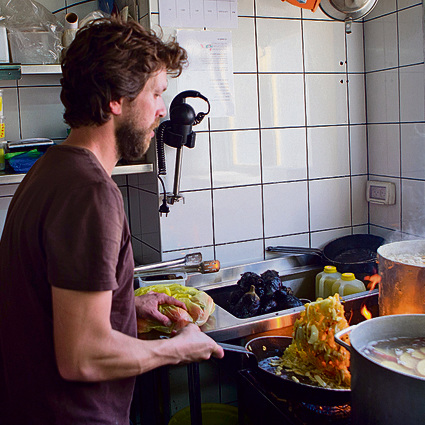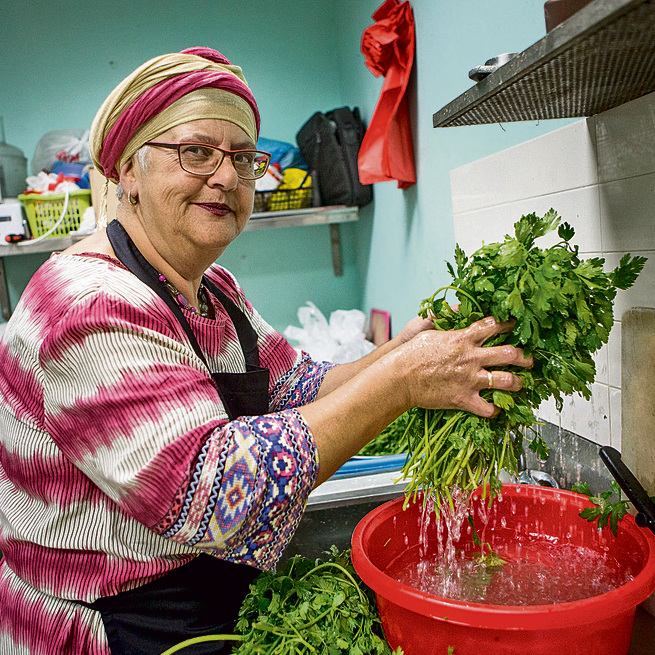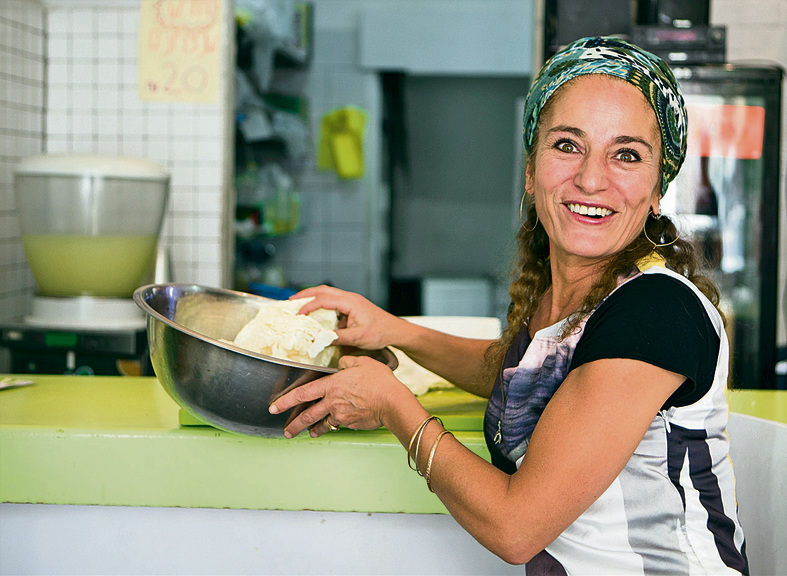

Women working to break Rabbinate’s monopoly over kashrut supervision
Hemdah Shalom and Avivit Ravia are the two only female kashrut supervisors in Jerusalem, working on behalf of the Hashgacha Pratit organization, which offers businesses an alternative kashrut model. We joined them on a tour of restaurants which are already using their services in order to learn how things can be done differently.
It’s 8am at Jerusalem’s Mahane Yehuda Market. While the sleepy peddlers slowly arrange their stands and lazily lay out the goods on the shelves, at the Pasta Basta restaurant things are already in full swing: A woman wearing a pink-white headdress and a pair of delicate earrings is dipping her hands in a bundle of aromatic basil.
“I sort out the rotten leaves, and put the rest in vinegar water or saltwater,” she explains with a lively smile. “The water is supposed to dissolve all the sticky stuff that the insects secrete in order to protect themselves, and it also exposes the insects left on the leaves. Then you have to wash the leaves under running water.”
After she is done with the basil, she moves on to mushrooms. “The mushrooms grow on a growing medium which is not threatened by insects, but there are sometimes cases of cobwebs and spiders, so we have to check it out,” she says. “That’s what the Jewish Halacha says.”
Her name is Hemdah Shalom. She is 56 years old and is one of the two only female kashrut supervisors in Jerusalem on behalf of the Hashgacha Pratit (“private supervision”) organization, which offers an alternative kashrut model for restaurants and businesses and is breaking not only the Chief Rabbinate’s monopoly over kashrut in Israel, but the male monopoly as well.
There is only one tiny problem that is preventing the organization from equally competing for the right to provide kosher permits: Under the law, which was passed by the kashrut monopoly’s representatives in the Knesset, the Chief Rabbinate is the only body authorized to grant businesses kashrut certificates.
When Hashgacha Pratit started operating, the Rabbinate began fining businesses that used the organization’s services and presented themselves as kosher for “violating the law against kashrut fraud.” The owners of two restaurants in Jerusalem decided to fight these fines by petitioning the High Court of Justice, arguing that the Rabbinate was violating the freedom of religion. The petitioners were even backed by then-Attorney General Yehuda Weinstein, who made it clear to the High Court that he did not see any legal offense in their conduct as long as the alternative kashrut certificate did not explicitly use the word “kosher.”
The petition was rejected, but Hashgacha Pratit requested another hearing with an extended panel of judges. Chief Justice Miriam Naor approved the request, and the hearing of the petition was expected to be resumed this week with a seven-judge panel. The state’s response to the petition last week revealed that the attorney general had changed his mind. Unlike Weinstein, Avichai Mandelblit—a religious Jew—objects to the presentation of alternative kashrut certificates even without the word “kosher.”
This situation, he says, “could lead the public to unknowingly commit dietary transgressions.”
The significant change, however, is that the Israel Hotel Association and the Israel Restaurant Union have decided to take a stand and join the petition against the Rabbinate.
'I know a little bit more about cooking'
Meanwhile, it’s business as usual for the women kashrut supervisors. Under the exceptions of the law, they make sure that the place is kosher, but they don’t grant a certificate.
“I don’t understand who decided that kashrut supervision is a man’s job,” says Hemdah Shalom. “With all due respect, I know a little bit more about cooking. The male monopoly in the field comes from the Rabbinate’s need to give yeshiva students a livelihood that relates to their main occupation—Torah studying. They can also be allowed to be supervisors, but not exclusively. Women deserve it too.”
From a halachic perspective, there is indeed no reason why women cannot work as kashrut supervisors. In practice, however, apart from a few exceptions, all supervisors in Israel are men. For years, the Chief Rabbinate refused to allow women to participate in kashrut supervision courses “for modesty reasons,” and it remained an exclusively male profession.
Shalom and other women refused to accept the discrimination and joined a battle led by the Emunah movement against the Ministry of Religious Services and the Rabbinate to allow women to become part of the kashrut system. After an 18-month struggle, which included a High Court petition, Chief Rabbi David Lau ordered the Rabbinate to allow the Emunah women to take the kashrut supervision tests. Sixteen of the course’s female graduates took the exam—not in the same room as the men, of course—and they all passed with flying colors.
“There is still a long way to go,” Shalom says. “I hope that in the future the Rabbinate will actually start employing women.”

From Pasta Basta we move on to Falafel Mula on Agripas Street and to piles of parsley. On the way, Shalom tells me that she was born and raised in Jerusalem’s Kurdish neighborhood and has five children. She was always traditional, but in 2000 she decided to become religious.
“My children studied in the religious education system, but today they are secular and I respect them,” she says. “My husband is a light ‘shomer Shabbat.’”
In 2013, she joined the first course of its kind for female kashrut supervisors, purely out of curiosity. “As someone who became religious, I always feel like I don’t know enough. I wanted to study the field.”
After completing the course, Shalom passed the Rabbinate’s entrance exams. She chose, however, not to work as a kashrut supervisor on behalf of the Rabbinate but to turn to the Hashgacha Pratit organization, which was founded by Rabbi Aaron Leibowitz. The organization offers a private kashrut certificates and provides services to some 25 businesses in Jerusalem and in central Israel. It employs a total of three supervisors, two of whom are women.
Hashgacha Pratit undermines not only the male dominance of the Chief Rabbinate, but its working methods as well, amid increasing complaints about the sloppy work and aggressive conduct of some of the Rabbinate’s supervisors.
“The difference between us and the Rabbinate is that we are not forced on them by the law,” Shalom says. “We are not policewomen. We work alongside the employees as equals.”
Shimi Amiga, one of the owners of Falafel Mula, agrees. “The Rabbinate supervisor would come for 10 minutes and leave, and a minute after he was gone I could sell a camel,” he says, arranging his skullcap. “A year ago we moved to Hashgacha Pratit, because I realized that people don’t eat the kashrut certificate but the owner’s credibility. My supervisors are here to work.”
And how do the customers react?
“Some customers stare at me wide-eyed when I tell them I have a woman supervisor here. It’s hard for them to let go of their fixation. But those who know (the supervisors) eat here (and trust them completely).”
Working together
Not far from there, at the Vegetarian Shawarma in the city center, Avivit Ravia takes on a cauliflower. Ravia, who is wearing a green headdress and large round earrings, is also a kashrut supervisor on behalf of Hashgacha Pratit. As I tour the place with her, I get the impression that she has a very friendly and pleasant relationship with the business owners and employees.
“The loyalty comes precisely from this approach,” she says. “After all, everyone can try to fool us, but we don’t come from a place of authority. The whole idea is to work together, to trust each other. If I catch someone deceiving me, it clearly won’t go on.”
She is 49 years old, the 14th generation of Jerusalem natives in her family. She was raised secular in the Rehavia neighborhood, but became religious at the age of 30 and moved to the ultra-Orthodox city of Beitar Illit, where she raised her seven children. “I was hardcore religious,” she says.
When she heard that a course for female kashrut supervisors was about to open, she was curious and decided to join. The Halacha studies helped open her up to new approaches.
“I suddenly started seeing that there are different things here. I realized that nothing is unequivocal, neither from a religious perspective nor from a Haredi perspective,” she says.
This insight grew stronger when she faced the fortified wall of the Chief Rabbinate after completing the course. “I couldn’t understand why I was not allowed to be part of it,” she says. “Why can a man be a supervisor while I can’t?”
Why, indeed?
“They had no halachic argument. All the arguments were, ‘Listen, it’s immodest, it’s hard work in which you have to carry heavy things.' They had no serious arguments. After all, who is in the kitchen? Naturally, it has always been a woman’s place. So suddenly I’m not good enough when it comes to kashrut? Religion’s attitude towards women has to change. We're in 2017.”
One of the businesses supervised by Ravia is Modus Café in central Jerusalem. “I don’t believe in kashrut in general, but the building’s owner is religious and I have to be kosher,” says the café owner, Lior Gutraiman. “I favored Hashgacha Pratit over the Rabbinate because in this thing called Judaism, their approach is much more liberal, and employing women is a big part of it.
“This café used to have a Rabbinate supervisor, but apart from coming in to drink espresso and pick up his check at the end of the month—he did nothing. I can say to religious people that they would be better off relying on Hashgacha Pratit than on the Rabbinate, because the people here are much more serious and are really strict.”
Isn’t this a lost battle? You’re in a city which is becoming more and more Haredi.
“On the contrary, it seems to be working. At some point, the Chief Rabbinate will be erased, and in the future there will be many rabbinates—a Reform rabbinate, a Breslov rabbinate, an Uman rabbinate. There will be different movements, because it’s impossible for one institution to control the word ‘kosher.’ When that happens, maybe people will also be able to get married in Israel.”
Ravia agrees. “I really feel that this is a revolution,” she says. “It’s not just religion, there is a social aspect here as well. A connection has been created here between all kinds of populations, and when you encounter people who are different from you on a daily basis, you become more and more accepting, and that’s wonderful.”

















